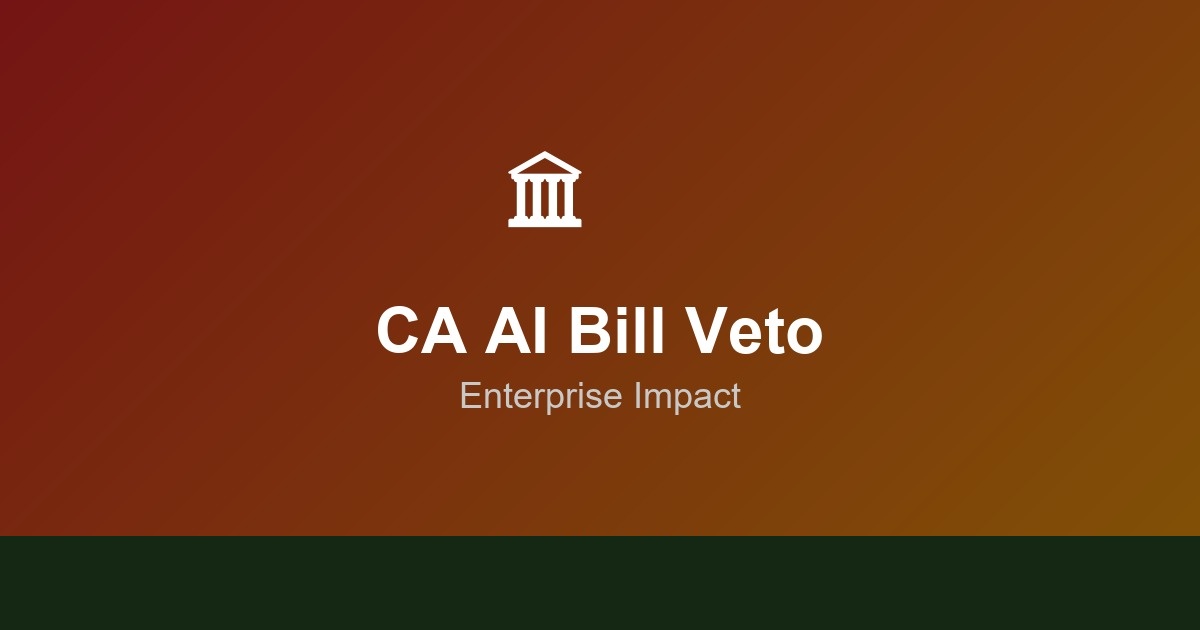Untitled

In an era where artificial intelligence is rapidly reshaping industries, California's pioneering AI safety legislation—including the Transparency in Frontier Artificial Intelligence Act (SB 53) and AB 1018—marks a critical juncture for enterprise strategy. This isn't merely another regulatory hurdle; it's a strategic imperative that demands proactive engagement from business leaders. The question is no longer *if* AI regulation will impact your enterprise, but *how* you will transform compliance into a competitive advantage, driving measurable ROI and mitigating significant risks.
The New Regulatory Landscape: A Strategic Shift for Enterprises
The recent legislative actions in California signify a profound shift in the regulatory paradigm, moving the focus from AI users to the developers and deployers of AI systems. This distinction is paramount for enterprises, as it places a heightened responsibility on them to ensure the safety, transparency, and ethical integrity of the AI solutions they develop and implement. The legislation introduces stringent requirements across several domains, fundamentally altering how enterprises must approach AI development, deployment, and governance.
Core Legislative Pillars and Their Tangible Enterprise Impact
California's AI safety framework is constructed upon several foundational pillars, each carrying direct and significant implications for enterprise operations and strategic planning:
Transparency: The mandate for large frontier AI developers to publicly disclose their AI governance frameworks necessitates a new level of corporate openness. For enterprises, this translates into an urgent need for robust internal processes, meticulous documentation, and transparent external communication strategies to articulate their commitment to responsible AI. Failure to establish clear transparency protocols can lead to reputational damage and erosion of stakeholder trust. Innovation: The establishment of CalCompute, a public computing cluster, is designed to catalyze the development of safe, ethical, and sustainable AI. This initiative offers a unique opportunity for enterprises to engage in collaborative research, contribute to cutting-edge AI advancements, and potentially leverage public-private partnerships to accelerate their own responsible AI initiatives. Proactive participation can yield early access to best practices and innovative solutions. Safety: The creation of a formal mechanism for reporting critical safety incidents underscores the indispensable role of comprehensive risk management in AI development and deployment. Enterprises must implement rigorous safety protocols, conduct thorough risk assessments, and establish clear incident response plans. Neglecting these measures can result in catastrophic system failures, legal liabilities, and severe financial repercussions. Accountability: Provisions for whistleblower protections and the imposition of civil penalties for non-compliance highlight the critical need for robust governance and verifiable audit trails. Enterprises must ensure their AI systems are auditable, their decision-making processes are explicable, and their internal controls are sufficient to demonstrate adherence to regulatory standards. A lack of accountability can expose organizations to significant legal and financial penalties, impacting their bottom line and market standing.Beyond Compliance: Cultivating Competitive Advantage Through Responsible AI
While these new regulations undoubtedly necessitate operational adjustments, they simultaneously present a powerful opportunity for enterprises to forge a distinct competitive advantage through responsible AI practices. By proactively embedding transparency, safety, and accountability into their AI strategies, businesses can cultivate deeper trust with customers, attract and retain top-tier talent, and significantly enhance their brand equity. The dual-responsibility model, which delineates obligations between AI developers and deployers, further emphasizes the strategic importance of meticulously vetting AI vendors and ensuring their alignment with an enterprise's commitment to ethical and compliant AI.
The ROI of Responsible AI: Mitigating Risk and Unlocking Sustainable Value
The economic rationale for investing in responsible AI is compelling and quantifiable. The direct costs of non-compliance—including substantial fines, protracted legal battles, and irreparable reputational damage—can severely impact profitability and market valuation. Conversely, the strategic benefits of a responsible AI framework are profound: improved decision-making accuracy, reduced algorithmic bias, enhanced customer loyalty, and the cultivation of long-term, sustainable growth. By prioritizing responsible AI, enterprises can achieve measurable outcomes such as reduced operational risk, increased efficiency through optimized AI systems, and ultimately, solidify their position as market leaders.
California's new AI safety legislation is more than a regulatory mandate; it is a clarion call for enterprises to integrate responsible AI as a fundamental pillar of their strategic vision. Organizations that embrace this challenge will not only navigate the evolving regulatory landscape successfully but will also unlock the full transformative potential of AI, driving unprecedented business success and fostering a more trustworthy digital future.
References
- Industry research and analysis from leading AI technology providers and research institutions.
- Enterprise AI implementation case studies and ROI analysis from Fortune 500 companies.
- Market research reports from Gartner, McKinsey, and other leading consulting firms on AI adoption trends.
- Technical documentation and whitepapers from AI platform vendors and service providers.
- Regulatory compliance frameworks and guidelines for AI implementation in enterprise environments.
Ready to Implement AI in Your Enterprise?
Our team of AI experts can help you navigate the complex landscape of AI infrastructure and implementation. Book a free consultation to discuss your specific needs.
Book Free Consultation